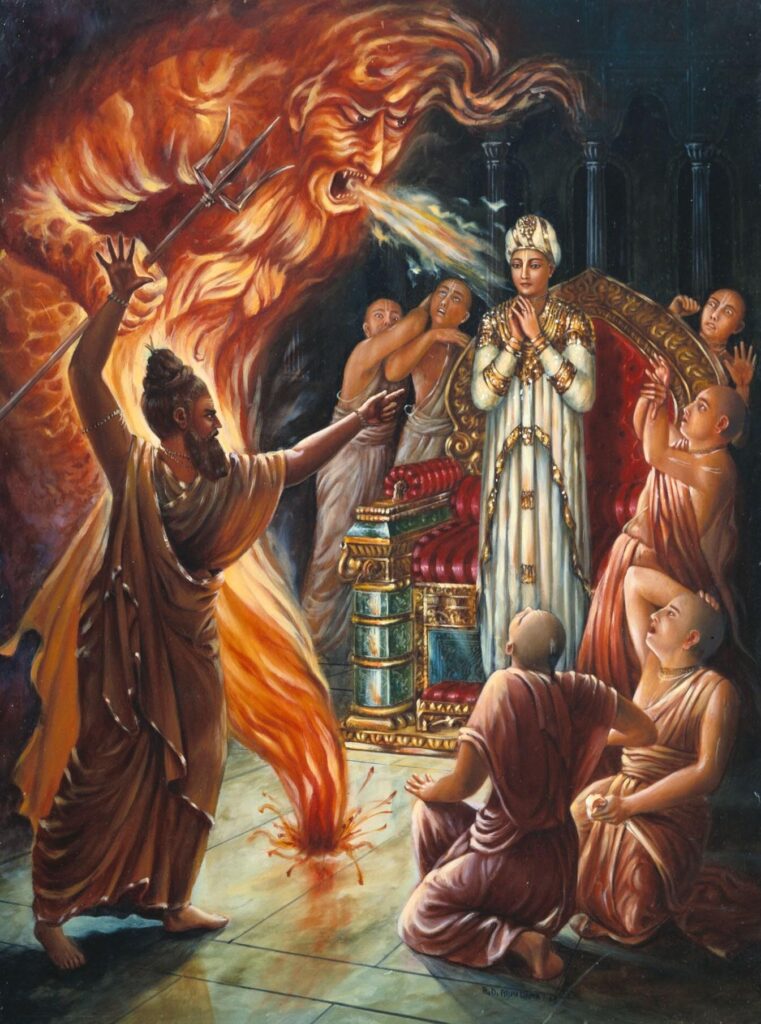In the teachings of Prahlada Maharaja, narrated in the 7th canto of Srimad Bhagavatam, it’s described that “if a śva-paca or caṇḍāla is a devotee, he delivers not only himself but his whole family, whereas a brāhmaṇa who is not a devotee but simply has brahminical qualifications cannot even purify himself, what to speak of his family.”
This is one amongst many verses in the scriptures that describe the transcendental position of Vaishnavas, being superior to Brahmanas who are just following the prescriptions of the scriptures, without developing love for Krsna. This point is exemplified by the pastime of Druvada Muni offending Ambarisa Maharaja. Druvasa Muni was surely qualified as a Brahmana, but being a devotee, Ambarisa Maharaja was able to show qualifications that were far superior.

Based on these descriptions, we like to count ourselves as Brahmanas, or even higher than Brahmanas. In fact, Srila Bhaktisiddhanta Sarasvati Thakura quoted from these same passages when he established brahminical initiation to his disciples, sustaining that there is no problem in a Vaishnava from a low family being initiated as a Brahmana and acting as one since in any case, a Vaishnava is superior to a Brahmana and automatically shows the qualities of a Brahmana.
What we overlook, however, is that these passages from the scriptures speak mainly about pure Vaishnavas, who already situated themselves in the liberated platform. On SB 7.9.10, for example, Prahlada Maharaja mentions that:
“If a brāhmaṇa has all twelve of the brahminical qualifications [as they are stated in the book called Sanat-sujāta] but is not a devotee and is averse to the lotus feet of the Lord, he is certainly lower than a devotee who is a dog-eater but who has dedicated everything—mind, words, activities, wealth and life—to the Supreme Lord. Such a devotee is better than such a brāhmaṇa because the devotee can purify his whole family, whereas the so-called brāhmaṇa in a position of false prestige cannot purify even himself.
We can see that the verse describes a devotee who dedicated everything to Krsna. In his purport, Prabhupada confirms that “A devotee is better than anyone, for he is in the transcendental position on the Brahman platform.” This confirms that this is the description of a devotee situated on the transcendental platform.
This may partially also apply to a neophyte devotee (who although not pure, is at least trying to serve Krsna), but such a neophyte may not show all the qualities of a Brahmana, although he may be on the right path. As Srila Prabhupada mentioned in some of his addresses during the initiations of his disciples, the Brahminical initiation is just the beginning. To become qualified Brahmanas we need to follow up and continue our training.
We can practically see this working in practice when we observe that often relationships between devotees in our movement are not on par with what would be expected from genuinely high personalities. We have serious difficulties in maintaining healthy relationships and even more difficulties in working together and cooperating. Even inside family life, we don’t do very well as we can notice observing the high rate of divorces in our movement.
Srimad Bhagavatam 11.16.17 describes the qualities of a Brahmana: “Peacefulness, self-control, austerity, cleanliness, satisfaction, tolerance, simple straightforwardness, devotion to Me, mercy and truthfulness are the natural qualities of the brāhmaṇas.”
What is more significant however is 11.16.21, which describes the basic qualifications for all members of society, including the Sudras: “Nonviolence, truthfulness, honesty, desire for the happiness and welfare of all others and freedom from lust, anger, and greed constitute duties for all members of society.”
All four classes are supposed to have all these qualities, combined with the additional qualities prescribed for their respective class. A brahmana for example is supposed to combine the qualities mentioned in both verses. However, all members of society, even the Sudras, are supposed to have at least the qualities mentioned in the second verse.
What is more striking however is the description of people who are outside civilized society: “Dirtiness, dishonesty, thievery, faithlessness, useless quarrel, lust, anger and hankering constitute the nature of those in the lowest position outside the varṇāśrama system.”
People who possess such qualities will not work very well in any organized society, therefore in the Vedic system, they live outside and form their own groups amongst people with similar qualities. They somehow also live, but their lives are not so progressive and their social relationships are not so nice.
The problem is that most of us come from such backgrounds. We learn from birth to quarrel, we become angry, we indulge in lust, we hanker, and we may even be dishonest at times. To be able to work in society, we have to at least ascend to the basic level of civilized qualities (nonviolence, truthfulness, honesty, desire for the happiness and welfare of all others, and freedom from lust, anger, and greed). We can see that these qualities demand serious practice of Krsna Consciousness, combined with a lot of introspection, humility, and internal cleansing. We should understand that most of us are not Brahmanas, but outcasts still trying to learn the principles of civilized life. We have the highest path, but we have to honestly ask ourselves how far we are in this path.
The day we will be able to peacefully live together in a spiritual society, the day we will properly treat our spouses, family members, and children, that’s the day when we will be able to honestly say that we are following what we preach.
